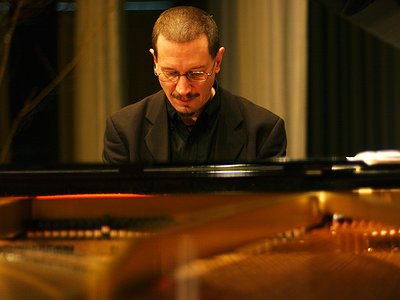Purpose as a material
Derek Bailey defined improvising as the search for material which is endlessly transformable. Regardless of whether or not you agree with his perspective, what kind of materials have turned to be particularly transformable and stimulating for you?
Here, I will return to my question of PURPOSE. Why this question is so often ignored, I do not know. Purpose is my material. I feel at home in atonality and when using dramatic or literary gestures and pictures, and in a sense of communicating the drastic and the elementary. This is connected to my experiences, and part of a message and a thought-system I feel is needs to be stated in the present world. The language used can be very different – cubistic or lyrical or jazzy or Oriental, or humorous, or folky, or.................yes, purpose is transformable.
Purportedly, John Stevens of the Spontaneous Music Ensemble had two basic rules to playing in his ensemble: (1) If you can't hear another musician, you're playing too loud, and (2) if the music you're producing doesn't regularly relate to what you're hearing others create, why be in the group. What's your perspective on this statement and how, more generally, does playing in a group compare to a solo situation?
The first statement is wrong – there are no taboos in communication, including drowning out the others inconsiderately. Everything which transports expression and “reality” or tension is acceptable. Boredom is not. The second statement is obvious, without forgetting that even active non-communication can be communication. Solo is more intimate, group playing more fun.
Some people see recording improvised music as a problem. Do you?
Not in the least.
In the 20th century, the relationship between music and other forms of art – painting, video art and cinema most importantly - has become increasingly important. How do you see this relationship yourself and in how far, do you feel, does music relate to other senses than hearing alone?
If you know about my music, then you know that these relationships are more than self-evident to me. Again, my music often has a “story-teller” nature and I am basically a theatrical composer – one who has written much film music, ballets, an opera, programme music, music for the theater, and worked intensively with vocalists, poets and artists. The literary tendencies in my music are unavoidably obvious. If purpose is important, then it won't be the formal aspects of the music which are the priority, but the messages transported – by whatever means.
In how much, do you feel, are creative decisions shaped by cultural differences – and in how much, vice versa, is the perception of sound influenced by cultural differences?
This is a superfluous question since culture is the basis of everything. I don't see the human race or its musicians or the recipients of music as having ever left the ritualistic and the religious. Music doesn't even exist unless you believe in its symbiotic value and understand the syntax. Otherwise it would be sound, and, of course, we are not talking about sound perception, but the interpretation of non-linguistic acoustical MEANING. We, as a species, have a general and common understanding as well as a specific and individual understanding of acoustical messages.
Do you feel it important that an audience is able to deduct the processes and ideas behind a work purely on the basis of the music? If so, how do you make them transparent?
It is not my job to make anything transparent. Generally speaking, it is ideal if a spontaneous reaction is possible without undermining the ability to deepen the understanding through information and education.
Usually, it is considered that it is the job of the artist to win over an audience. But listening is also an active, rather than just a passive process. How do you see the role of the listener in the musical communication process?
I don't want to win over any audience. I see myself as someone willing to share and give something valuable and sometimes even unrepeatable to an audience. Most listeners realize this when they hear my playing and feel its integrity. Those who don't, have denied themselves this gift – either because they don't like it or because they don't understand it. This is their right.
Music-sharing sites and -blogs as well as a flood of releases in general are presenting both listeners and artists with challenging questions. What's your view on the value of music today? In what way does the abundance of music change our perception of it?
The human race – led by the materialistic West – is in the process of denying and rolling back its very humanity. Focus and courage are in danger of being processed out of the domain of human experience – for sure, they certainly are not in fashion. Value of anything has been reduced to its sales value. We, as humans are becoming a set of molecules at ease with being sold on the marketplace of spiritual prostitution. Our thrills are being cheapened and our outlooks thinned, our beliefs and ideals caged in pig-sties. The banalisation process has beheaded the intellectual and enthroned the mundane. The Music Industry has targeted the truthful and the worthy as bitter enemies and lifted up the cheap and backward to the godlike. It has taken upon itself to empty the hearts and minds of the young and intoxicate and sicken the mature and healthy. It will probably take an apocalypse to dock back on to the good side of the human spirit, but a hearted composer just has one thing to do: work. This may sound dramatic – it is.
Please recommend two artists to our readers which you feel deserve their attention.
Johannes Ockeghem (1420-1497), Renaissance composer. Carl Schuricht (1880-1967), German conductor.
To find out more about Chris Jarrett, visit his website: http://www.chrisjarrett.de/






